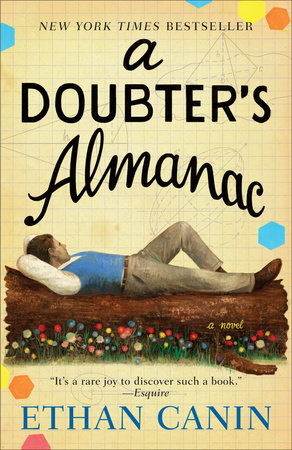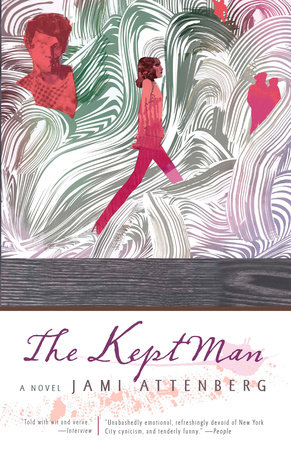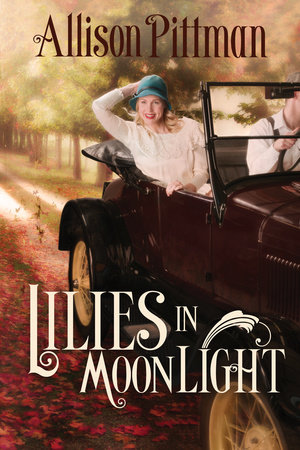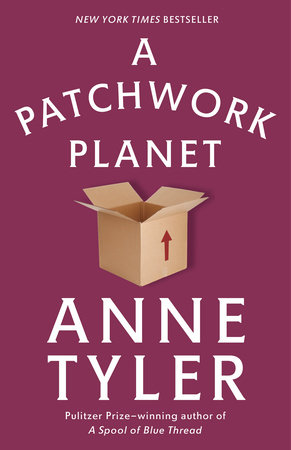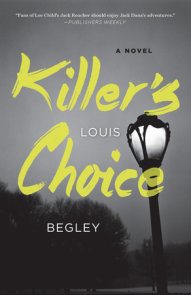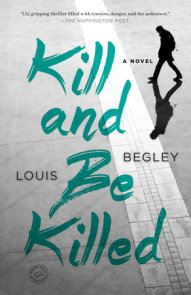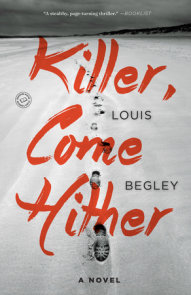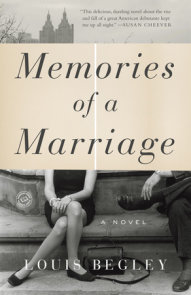Author Q&A
A Conversation with Louis Begley
George Andreou is an editor at Alfred A. Knopf.
GA:When did it first occur to you to write a sequel to About Schmidt?
LB: I first thought that continuing Albert Schmidt’s story was possible, and would be fun, when I was finishing Mistler’s Exit, the novel that followed About Schmidt and preceded Schmidt Delivered. I knew the ending of Mistler’s Exit; it was just a matter of getting it down on paper. So I did not feel guilty about flirting with another project.
GA: How has your hero, Albert Schmidt, evolved since the days of the first book? It was particularly amusing to observe someone so tempera-mentally at odds with the culture at large–has that gulf widened?
LB: By "culture at large" you must mean popular culture. I have never thought that Schmidt was at odds with American culture, as the word used to be understood, before people began to talk about such things as the culture of a particular big accounting firm or investment bank specializing in junk bond financings.
If you are referring to popular culture, the gap has narrowed. Carrie, his half-Puerto Rican waitress friend, who is approximately forty years younger than Schmidt, has taught him quite a lot about how the rest of the world lives. Loving and admiring her has made Schmidt far more tolerant. Yes, I do think my friend Schmidtie has matured–a word I prefer to "evolved"–like plums that you buy at a fruit stand when they are hard and leave to ripen in the sun on the ledge of your kitchen window. That, too, is the effect of love, as well as time.
GA: Do you think this book clarifies, or further complicates, the much commented-upon question of Schmidt’s anti-Semitism? Were you surprised or influenced by the reception he received with the appearance of the first installment?
LB: In About Schmidt, I presented a portrait of a man of Schmidt’s age and milieu at the time the action of that novel takes place, which is the beginning of the 1990s, with a great many flashbacks to the preceding decades. It would not have been unusual for such a man, the product of a New York Anglo-German middle-class family with some plumage–the parents lived in a house on Grove Street, the father was the senior partner in an admiralty law firm with a Greek ship owner clientele and some money–and of an education in a Jesuit high-school and Harvard College and Law School, to have the sort of mild anti-Semitic feelings I have ascribed to Schmidtie. Bear in mind that his is not an active sort of anti-Semitism. He does not practice it in his law firm; on the contrary, I have him be particularly decent to Jewish associates. He does not trumpet his feelings, and he is not proud of them. He knows that they get him in trouble with his wife, Mary. But, they are part of the prism through which he looks at the world. Please bear in mind also that my portrait is not of the sort you hang on the wall of the bar association library: it does not flatter. Instead, here and there it caricatures the subject’s traits. I thought that this particular trait was worth mentioning, for the sake of realism, for the sake of seeing Schmidt’s anti-Semitism dissolve as he becomes deeply involved with Carrie (who is the object of similar prejudice), and quite simply for the sake of poking fun at people I have known.
I duly noted, when About Schmidt first appeared, that many reviewers seemed to concentrate their attention on my protagonist’s anti-Semitism– although anti-Semitism is not, in my opinion, the most interesting aspect of his personality–but I am not sure whether I was surprised.
In order to be surprised, I think I would have had to think in advance to what the reviews of my book might be. But I didn’t and I never have. When reviews do come out, with exceptions, for instance when I know the reviewer or have special admiration for the reviewer’s work, I only scan them.
I should add that, in my opinion, an author who thinks how his book will be treated by reviewers while he is writing, and, worse yet, tries to "correct" his work to anticipate criticism, is in bad trouble. I think I am responsible to only one critic, and that is myself.
GA: Did you ever consider letting Schmidtie live out the rest of his days with Carrie? (He wouldn’t be the first man his age to accomplish such a feat!) Or did you regard it as inevitable or meaningful that he "set her free," and if so, why?
LB: Of course, I could have done just that. But I didn’t really consider such a solution because both Schmidt and Carrie are too lucid to have accepted it. Carrie recognizes the powerful sexual content of her relationship with Schmidtie and refuses to have a future in which caresses are not followed by intercourse. Of course, couples can have a happy and fulfilled relationship after the man’s ability to perform has waned, but these are couples in which the age difference is not so great. Couples united by interests more profound and more nourishing than those that Carrie and Schmidtie seem to share. Schmidtie certainly knows that.
Yes, I think that Schmidt’s generosity and elegance when he lets her go with Jason are very important. They let the reader see his intrinsic decency.
GA: Schmidt seems to be your only protagonist whose story does not involve some fundamental deception. Your other heroes seem either to be living a lie, passing for someone they are not (I think of Maciek in Wartime Lies, Ben in The Man Who Was Late, even, to a degree, Max in As Max Saw It), or otherwise concealing a more discrete but terrible truth (as with Mistler in Mistler’s Exit). Does Schmidt’s authenticity, so to speak, set him apart in your mind? In what ways, if any, does this make it a different type of story to tell?
LB:You are right, and you have asked a very difficult question. Schmidt is different from my other protagonists. I would say that he is more ordinary. I know a number of men like him. His story is not tragic–except in the way all lives are tragic. Most of us lose to illness people whom we have loved; we all age and must face the decline of our powers and our own illness and death; we make bad decisions the consequences of which cannot be undone; and we have heartbreak relations with our parents and our children even if, on most levels, they go well.
I would say that is where the difference lies between telling the story of Schmidt and that of my other protagonists. Schmidt requires a lighter tone, suitable for comedy. In the end, the tone dictates the choice of incidents to be related.
GA:You have come to be identified by some as a chronicler of the rich and powerful. Even among this elite, billionaires, a fixture of the nineties and of the so-called new economy, seem a breed apart. How typical is the Egyptian tycoon Michael Mansour? Are the rich different by degrees, or are the super-rich truly an "exclusive spiritual brotherhood," as you say? Do they have a code of their own?
LB: Ah, the anointed of Mammon! I do think the super-rich are a class apart, and I think I have done a pretty good job lampooning them. What is their essential defining characteristic? Perhaps there are two: certainly, their prodigious sense of personal entitlement–the right not only to the pursuit of happiness but also to guaranteed instant gratification; and a belief in their own well-deserved omnipotence. Since, on a whim, they can summon jets and helicopters and buy houses and works of art, why can’t they also buy people? They do–with money. If that is so, why shouldn’t they be able to direct those people’s lives, for their own good as the billionaire patron perceives it?
As I say in one of my books, Vespasian was wrong: money does smell. Its aroma acts as an aphrodisiac. In sufficient concentration, sniffed by your fellow billionaires, it confers on you admission to the "exclusive spiritual brotherhood" and its many domains on private islands and mountain tops, in deserts and historic palaces.
GA: One inevitably hears your writing described as "elegant." Does that always describe your goal in crafting prose, or do you sometimes find yourself writing against the grain of such expectations?
LB: I never write against the expectations of others or in order to meet them. I simply try to do my best. It is true that I correct and rewrite compulsively, sometimes until I am quite discouraged. I try to get to the point at which I can read the text to myself word for word without wincing.
GA:You call this book Schmidt Delivered, but though it begins with Schmidt living in bliss, he is aware almost from the start that his heaven with Carrie can’t last, and indeed it ends before the book does. In what sense should we see Schmidt as being "delivered" in these pages? LB: I think that "delivered" as applied to Schmidt in this book has at least three meanings. Wouldn’t I be wrong if I imposed any one of them on the reader? Shouldn’t the reader make his or her own choice? And isn’t it possible that more than one of them or perhaps all three are valid?
GA:At the end, Schmidtie seems literally on the threshold of a further adventure. Do you have a plan for another installment of his story?
LB:Yes, to be written after my friend Schmidt and I have lived a few more years.
GA:As a late-blooming writer you have developed with astonishing speed into a literary veteran, now with this sixth acclaimed book to your name. What has been your most interesting discovery about the writing process since your first novel? Has your way of going about it changed at all?
LB: I hadn’t realized how hard it is to write. I can’t imagine that breaking stones to build pyramids in Egypt together with my ancestors was harder.
No, my way of going about writing a novel hasn’t changed. I put together in my mind the essentials of the story and try to find the voice in which it can be told. Once I have found it, I get going.



